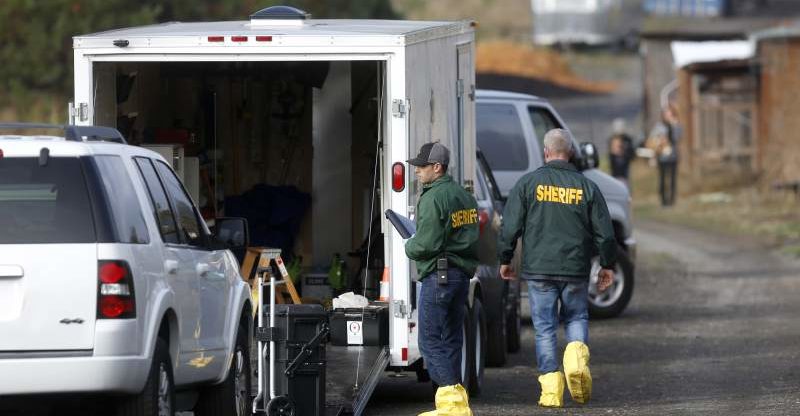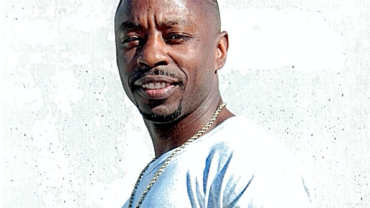One week after three people were gunned down at a rural Sebastopol home during a marijuana deal that left two dead and one seriously wounded, Sonoma County Sheriff’s officials have offered almost no new information about the case with an unknown gunman or gunmen still at large.
The deadly shooting echoes the troubling eruption, played out time and again on the North Coast, of violence among people involved with one of the region’s most lucrative crops.
Sheriff’s officials have repeatedly declined to elaborate on what they know about how much pot and cash were at play when the group gathered Oct. 15 at the Highway 116 South property in the Hessel area southeast of Sebastopol. They are still searching for a killer, who left behind a small mature marijuana garden and an unspecified amount of processed pot.
“We won’t give those intimate details,” Sgt. Spencer Crum said about the case. “Only the killer or someone in the house at the time of the killing should know that. We don’t want a false or tainted confession in the future.”

Sonoma County Sheriff’s deputy Joel Pedersen adjusts the crime scene tape at a triple shooting on the 5000 block of Highway 116 South on Sunday, October 16, 2016 near Sebastopol, California . (BETH SCHLANKER/ The Press Democrat)
On Saturday morning, the Sheriff’s Office released several photographs showing a man that investigators say was tied to the incident but not a suspect at this point. They asked for help in identifying the man and a woman seen with him in the aftermath of the crime.
The shooting occurred less than a month before California voters will decide whether to legalize recreational use of marijuana for adults. Legalization’s impact on crime is a key concern for both supporters and opponents of Proposition 64, the measure that will go before California voters next month. Some supporters say it would bring a black market industry out of the shadows, allowing regulated commerce that could make the industry safer.
At the same time, law enforcement groups, many of whom oppose legalization, have warned against a ‘‘yes’’ vote that they fear would bring more marijuana business to the state, expanding ties to unsanctioned markets elsewhere.
The specter of past violence continues to factor heavily in the debate.
Seven of 26 people murdered in Sonoma County since 2013 died during marijuana deals. Saturday’s shooting was the deadliest pot robbery since 2013, when three men were gunned down when a partner double-crossed them at a Forestville home.
In the Sebastopol slaying last week, former Cloverdale teacher Nathan Proto, 36, was shot at his home alongside two of his friends, including John Jessie Mariana, 28, of Guerneville, who died three days later from his injuries. The other victim, a 23-year-old woman who was shot in the head, is expected to survive.
Proto, who tended a marijuana garden where he lived, was a familiar face in the cannabis community, said Tawnie Logan, Sonoma County Growers Alliance’s executive director. Proto was not a member of the group.
“This hit close to home for quite a number of people,” said Logan. “The response is outrage, rage and fear. Then, ‘We have to address this.’ ”

A greenhouse full of marijuana at the rural Sebastopol property, shown on Sunday, Oct. 16, 2016. (KEVIN MCCALLUM/ PD)
The alliance opposes Proposition 64 because its members believe it’s written to favor big companies and disadvantage small-scale farmers.
But regulations now in the works for medical cannabis — approved by voters in 1996 but largely ungoverned since — are essential to bringing people into the legal market and boosting public safety, Logan said.
“This is a crime that could have been prevented with regulation,” Logan said.
Sonoma County Sheriff Steve Freitas said he will vote against Proposition 64 because he believes it will draw more marijuana-related crimes fueled by black markets elsewhere.
“I’m absolutely convinced that the only way to legalize it is to do it federally,” Freitas said. “As long as it’s illegal in Texas, they’re going to come here to get it.”
Officials and researchers in Colorado have sought to quantify changes in crime since marijuana’s recreational use was legalized in 2013.
Violent crime statewide rose about 13 percent between 2013 and 2015, according to a report released last month by the Rocky Mountain High Intensity Drug Trafficking Area, a law enforcement group that coordinates federal and state drug-suppression efforts.
But a June 2015 research project by students with the Metropolitan State University of Denver found no conclusive connection between marijuana legalization and rising crime rates.
Still, seizures of Colorado marijuana interdicted while being shipped in U.S. mail parcels have increased 427 percent when analyzing two-year time periods ending in 2012 and 2015, according to the drug trafficking group.
Tom Gorman, the group’s director, said his group is focused on tracking marijuana being shipped out of state. Gorman said they’ve observed an influx of organized crime growing marijuana in Colorado to be sold elsewhere.
“We have the legal market and then we have the legal-slash-illegal market — that’s where they’re doing it legally but distributing it illegally,” Tom Gorman said. “Then we have a strictly illegal-market with people hiding behind our laws.”
Denver District Attorney Mitch Morrissey is an outspoken critic of his state’s marijuana laws. He penned an Oct. 12 letter to the opponents of California’s Proposition 64 that provided a series of statistics from various agencies showing dramatic increases in crimes that he attributes to pot.
“California voters are being told that they will see the crime rate go down if they vote to legalize marijuana commercially; this has not been the case in the state of Colorado or the city of Denver,” he wrote.

Sonoma County Sheriff’s investigators work at the crime scene of a triple shooting on the 5000 block of Highway 116 South on Sunday, October 16, 2016 near Sebastopol, California. (BETH SCHLANKER/ The Press Democrat)
In an interview Friday, Morrissey said the murder rate in his city last year — with 50 people killed in 2015 — was the highest it had been in nearly a decade. Denver’s population is about 650,000.
Morrissey said that allowing people to grow marijuana in their homes has brought a new level of violence to residential areas. Earlier this month, a man was accused of shooting two teenagers after the 14- and 15-year-old boys sneaked into his backyard, apparently to steal his pot plants. One of the boys died and the other is still fighting for his life, Morrissey said.
“When it’s in people’s homes, that’s the least secure place and it’s a target,” Morrissey said. “The other factor is the large amount of cash involved and the fact they can’t bank this money.”
Since Saturday’s deadly shooting in rural Sebastopol, sheriff’s officials have not said what brought the trio and the unidentified shooter together for the marijuana deal or what roles each person played. Crum, a department spokesman, has said it may have involved a type of debt.
It’s also unclear how long the encounter lasted at the home and whether the attack stemmed from an argument or was an ambush. Officials declined to reveal how many times the three victims were shot or whether they suspect the killer or killers remain in Sonoma County.
Crum has said they are withholding those details to protect the integrity of the investigation while the perpetrator remains at large.
Santa Rosa cannabis lawyer Joe Rogoway said he believes once California establishes a program to track and trace medical cannabis — it’s expected to be in place by 2018 — there will be less violence. He called the current rules for medical marijuana “a nebulous space.”
“There won’t be ambiguity in the enforcement and determination of whether cannabis being produced is legal or not legal,” Rogoway said. “Regulators and law enforcement have new tools and will be empowered in new ways to curtail the black market.”
You can reach Staff Writer Julie Johnson at 707-521-5220 or julie.johnson@pressdemocrat.com. On Twitter @jjpressdem.
This article as first posted here http://www.pressdemocrat.com/news/6216638-181/deadly-toll-from-marijuana-violence?artslide=0








